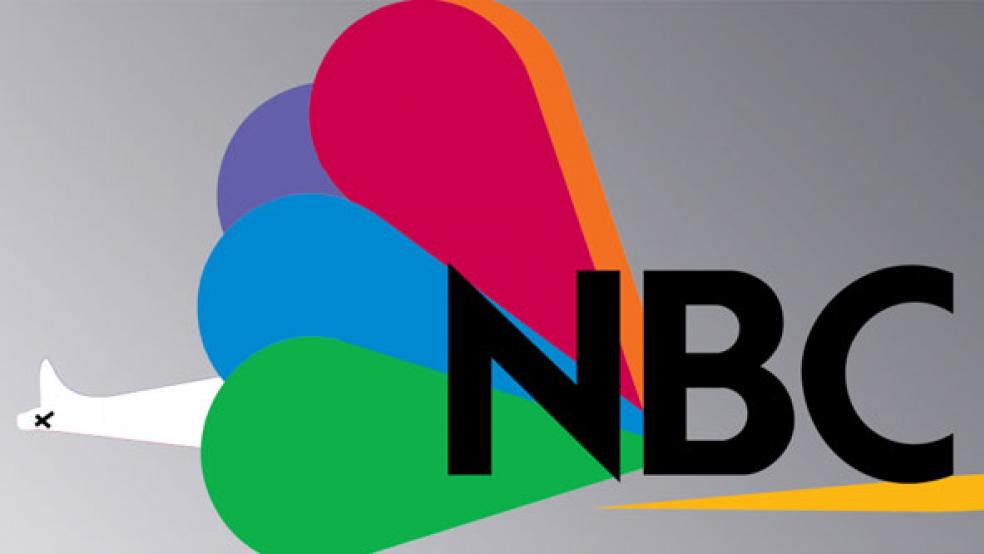What has gone wrong at NBC lately? The better question might be, What hasn’t gone wrong?
For the first time in history, NBC has dropped so low that it concluded the February "sweeps" period – when the networks' respective popularity is gauged – in fifth place, trailing CBS, Fox, ABC and, yes, Univision. In a cruel bit of irony, NBC's highest-rated program is "The Biggest Loser" (and isn't that an apt title to describe NBC these days?) logging in at a dismal 35th place.
The Peacock channel's plunge now seems implausible, largely because NBC, part of NBCUniversal, was No. 1 and showing firm signs of completing a stirring comeback as recently as last fall. Revenues for the broadcast division of NBCUniversal surged 27 percent last year to nearly $8.2 billion, the company reported this month, while operating cash flows rose almost 200 percent to $369 million. Even excluding the Olympics and the Super Bowl, revenue was up 4.8 percent. But the high ratings and promises of a resurgence have evaporated for NBC.
Perhaps the key to explaining NBC’s tumble from first to worst is arrogance. NBC has made the age-old mistake of possessing such visions of grandeur that it grossly misjudged what its audience wanted to watch in prime time. Sure, you could chalk up its decline to bad luck, too – or to sentiment such as, “The audience surprised us!” In an industry like TV, though, where the very-well-paid executives rely on focus groups and exhaustive research to help them make programming decisions, those excuses seem a little weak.
Signs of trouble are everywhere…again. As media writers will attest, rival ABC regularly – and gleefully – sends out email blasts to reporters describing how ABC is making inroads in the ratings in NBC's sacred territory, the 6:30 p.m. nightly news program. ABC is also making progress at the breakfast hour. CBS is also feeling optimistic, for the first time in years, in both of those time slots, thanks to an aggressive campaign to focus on hard news, not fluff.
NBC’s problems didn’t deter Comcast from agreeing to pay $16.7 billion earlier this month to buy General Electric’s remaining 49 percent stake in NBC Universal, and executives have acknowledged in the past that turning around NBC would take a long, long time. Recent reports estimate that NBC’s prime-time lineup loses well over $100 million a year.
In a sense, a television entertainment network is only as good as its last offering. But in NBC's case, this utter collapse is as shocking as it is riveting. NBC, you see, has stood for something unique in American TV over the last quarter-century. A generation ago, NBC boasted a Thursday night Murderers’ Row lineup that other network executives would have killed for. It seemed like a championship sports team with a bench greedily comprised of future all-stars. Just think about the glittering names: "The Cosby Show," "Family Ties," ER," "LA Law," "Cheers," Seinfeld" and many others.
NBC had a Midas touch. You got the feeling that if it aired merely the Yule log burning, its ratings in those days would somehow have trounced the network competition. On top of the brilliance of these innovative sitcoms and dramas, NBC had the shrewdness to command Thursdays, a lucrative evening of broadcasting when the marketing-fixated Hollywood movie studios would spend lavishly to advertise their weekend films on network TV. Competition from cable? It was hardly a force back in those halcyon days.
Yes, the television-ratings business is a cruel and fickle enterprise. The public votes with the flick of the remote-control clicker – and the networks are forever at the mercy of the public. The TV annals are littered with the debris of here-today-and-gone-tomorrow icons. Remember how America roared at the anti-heroic antics of the top-rated "Seinfeld" cast in the ‘90s – but only a year or two later, those same stars fell flat on their faces when they led their own comedy shows? Easy come, easy go.
Even with the network’s recent struggles, you don’t have to dive very deep into recent ratings history to see signs of progress. Powered by the ratings-rich drama-filled Summer Olympics and such shows as "The Voice" and "Revolution," NBC thrived last fall. It seemed, for a moment, like the return of NBC's once-famous slogan, "Must See TV." Especially on Sundays. Indeed, Sunday evenings – often a sleepy time, following CBS's "60 Minutes" – belonged to NBC, too, thanks to a slate of exciting and shrewdly marketed National Football League games. For the first time in about a decade, the perennially fourth-place network sat right at the top of the heap. Since then, NBC has gotten a severe reality check. As the Los Angeles Times recently pointed out: "This winter, NBC has learned the hard way just how fleeting victory can be."
For NBC, the problem is also one of perception. The network has lost its buzz altogether. In America nowadays, part of the fun of watching a hit show such as "Downton Abbey" or "Girls" or "Homeland" or "Mad Men" or "Breaking Bad" is gathering the next morning at the proverbial water cooler and talking animatedly with your friends all about the heroes and villains and plot twists.
When was the last time you waited for your coffee and overheard someone excitedly discussing ”Whitney” or “Guys with Kids”? With recent Thursday night mainstays like “The Office” and “30 Rock” ending their runs, NBC’s prime-time schedule has a dearth of even middling hits.
Put simply, NBC miscalculated in the most drastic manner. Its great hope, the TV version of a Broadway smash called, well, "Smash" came crashing down to Earth. The medical melodrama "Do No Harm" posted shockingly small ratings numbers for a new network drama before being canceled after two episodes. If you hadn't even heard of these shows, you certainly aren't alone. America roundly ignored them, too.
NBC had better get its act together -- and quickly. Otherwise, it faces the danger of being stuck in the quicksand of fifth place for some time. A new NFL season might help draw more viewers, but will that audience have any reason to stick around?






